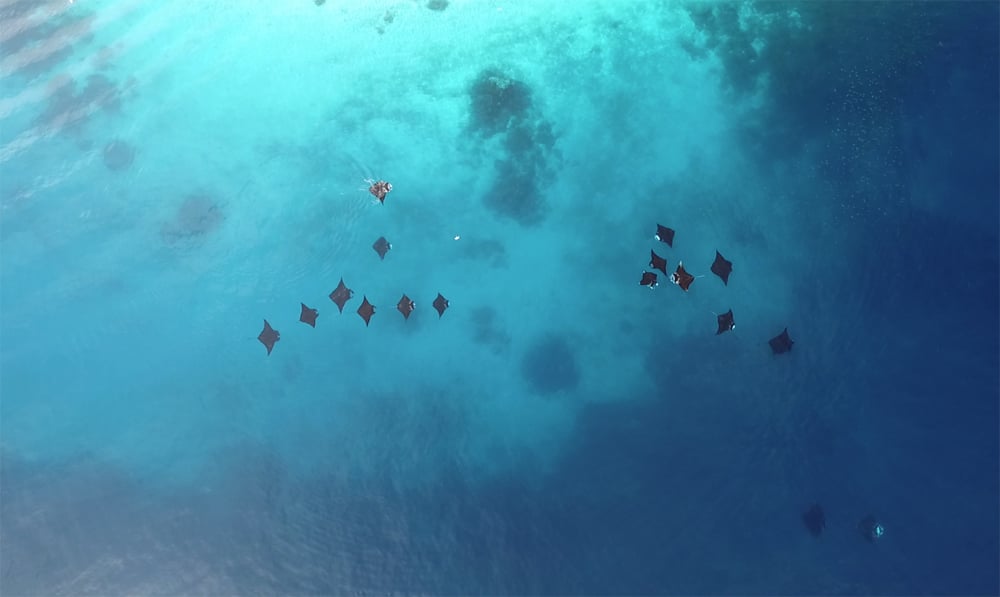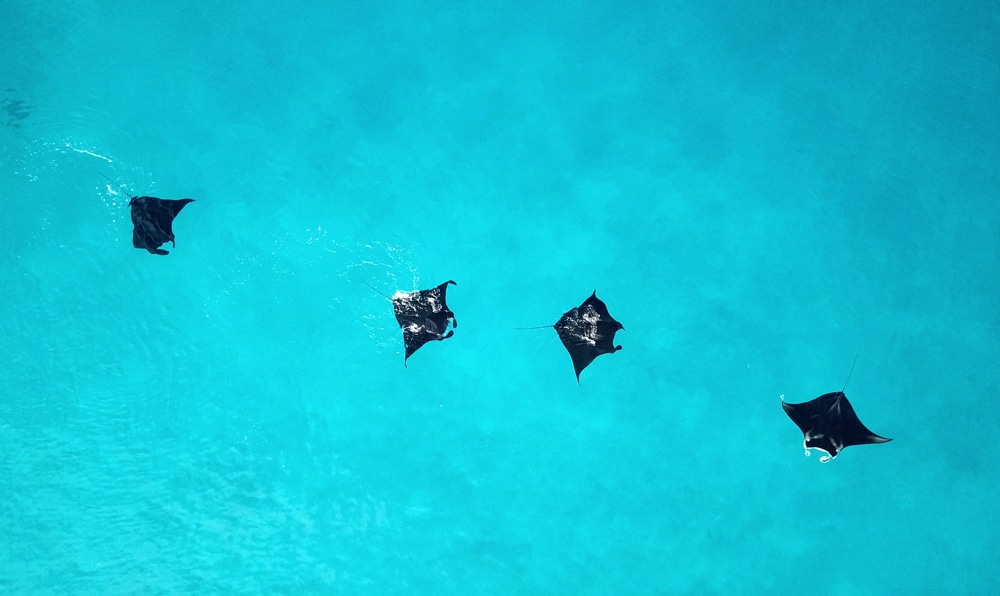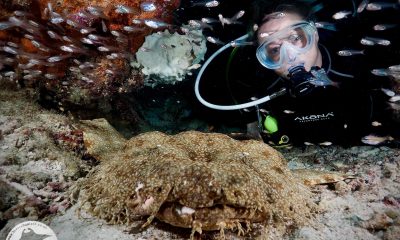News
MMF study shows manta rays form social bonds
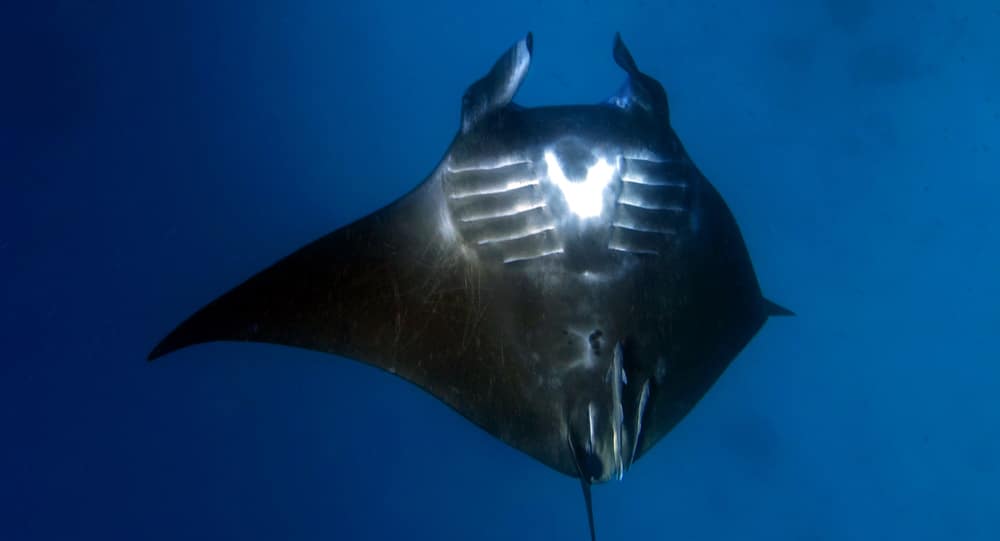
 Manta rays form social relationships and actively choose their social partners, a new study has revealed. Research published today by scientists from the Marine Megafauna Foundation, Macquarie University, the University of Papua, and the University of York is the first to describe the structure of social relationships in manta rays.
Manta rays form social relationships and actively choose their social partners, a new study has revealed. Research published today by scientists from the Marine Megafauna Foundation, Macquarie University, the University of Papua, and the University of York is the first to describe the structure of social relationships in manta rays.
Sharks and rays are often thought to be solitary creatures, but reef manta rays typically form groups at shallow-water feeding and cleaning sites. The researchers studied the structure of more than 500 of these groups over five years, in Indonesia’s Raja Ampat Marine Park, one of the most biodiverse marine habitats on Earth. They found two distinct but connected communities of rays living together. These social communities were quite differently structured, one being made up of mostly mature female rays, and the other a mix of males, females and juveniles.
“We still understand very little of how mantas live their lives, but we know they are socially interactive, and these interactions seem important to the structure of their populations. Understanding social relationships can help predict manta ray movements, mating patterns and responses to human impacts. That’s essential for conservation and ecotourism efforts,” said lead author Rob Perryman, a researcher for Marine Megafauna Foundation and PhD student at Macquarie University.
The study, published in the journal Behavioral Ecology and Sociobiology used social network analysis to show that manta ray communities contain a web of many weak acquaintances, with some stronger, longer-lasting relationships. Though they do not live in tight-knit social groups, the team noticed that female mantas tend to make long-term bonds with other females, while males did not have many strong connections. This could be due to different reproductive strategies or dispersal patterns.
“Like dolphins, manta rays are intelligent and perform collective behaviors such as foraging and playing. They are curious, often approaching humans, and individuals appear to have different personalities. It turns out that reef manta rays actively choose to group with preferred social partners,” Perryman added.
To identify social structures, the researchers took identification photos of all rays present in each group, and monitored whether individuals were more likely to be seen together (at different times and in different locations) than expected if encounters were random.
The locations used by the rays seemed to be important to their social relations. Manta rays form groups at cleaning stations where they are attended to by cleaner wrasse and other small fish. The team observed that certain social groups were regularly seen together at these sites, and so may be using them as social meeting points. Some rays had very strong affinity to certain cleaning stations. The researchers were surprised to find this given the close proximity of all sites and that mantas are generally mobile and wide-ranging animals. They concluded that the rays left and returned to preferred sites where they formed groups through a ‘fission-fusion’ social process.
Like many sharks and rays, manta rays are internationally threatened animals and population declines have been reported in various locations worldwide. They are hunted for their valuable gill plates used in traditional Chinese medicine. Other anthropogenic threats include injuries or entanglement in discarded nets and lines, pollution and habitat destruction.
It is important to find the right balance between preserving a species and encouraging sustainable wildlife viewing that brings economic benefits. “Knowing how mantas interact is important, particularly in areas where they are susceptible to increasing dive tourism,” said Dr Andrea Marshall, co-founder and principal scientist at the Marine Megafauna Foundation. “The increasing number of boats and scuba divers around reef mantas in Raja Ampat, particularly at cleaning stations, could break apart their social structures and have impacts on their reproduction.”
Dr. Ricardo F. Tapilatu, a co-author working at the University of Papua and the main Indonesian counterpart for the project said: “Pristine marine environments such as the manta ray aggregation sites in Raja Ampat are of increasing interest to tourists. This collaborative research is set in the extremely biodiverse region of the Coral Triangle, located in the Indo-Pacific, where we set up science-based conservation management for such unique natural systems.”
In Indonesia, manta rays are protected since 2014 but artisanal fishing remains an issue, and there is still little awareness of the threats they face. The team hopes that showing the social nature of manta rays will help broaden support and public enthusiasm for their protection around the world.
“Collecting more information about their social relationships and structures will be needed to develop sustainable ecotourism and conservation initiatives that allow mantas to coexist with humans in their natural habitats,” concluded Perryman.
This research was supported by Papua Explorers Dive Resort, Raja Ampat SEA Centre, University of Papua and Barefoot Conservation, and carried out under a RisTek-Dikti permit.
The study by Rob Perryman et al, titled ‘Social preferences and network structure in a population of reef manta rays’ is published in the journal Behavioral Ecology and Sociobiology on 22 August 2019 and will be available here.
To find out more about the Marine Megafauna Foundation visit their website by clicking here.
News
Dive Worldwide Announces Bite-Back as its Charity of the Year

Over the next 12 months, specialist scuba holiday company Dive Worldwide will be supporting Bite-Back Shark & Marine Conservation with donations collected from client bookings to any one of its stunning dive destinations around the world. The independently-owned operator expects to raise £3000 for the UK charity.
Manager at Dive Worldwide, Phil North, said: “We’re especially excited to work with Bite-Back and support its intelligent, creative and results-driven campaigns to end the UK trade in shark products and prompt a change in attitudes to the ocean’s most maligned inhabitant.”
Bite-Back is running campaigns to hold the media to account on the way it reports shark news along with a brand new nationwide education programme. Last year the charity was credited for spearheading a UK ban on the import and export of shark fins.
Campaign director at Bite-Back, Graham Buckingham, said: “We’re enormously grateful to Dive Worldwide for choosing to support Bite-Back. The company’s commitment to conservation helps set it apart from other tour operators and we’re certain its clients admire and respect that policy. For us, the affiliation is huge and helps us look to the future with confidence we can deliver against key conservation programmes.”
To launch the fundraising initiative, Phil North presented Graham Buckingham with a cheque for £1,000.
Visit Dive Worldwide to discover its diverse range of international scuba adventures and visit Bite-Back to learn more about the charity’s campaigns.
MORE INFORMATION
Call Graham Buckingham on 07810 454 266 or email graham@bite-back.com
Gear News
Scubapro Free Octopus Promotion 2024
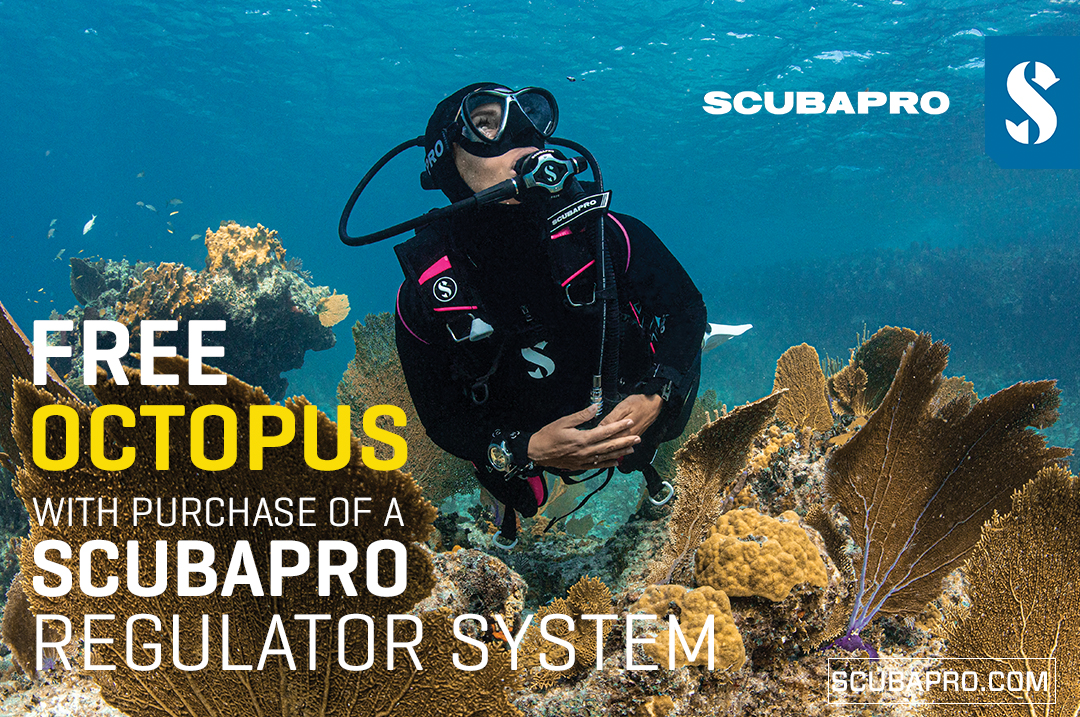
Free Octopus with every purchase of a SCUBAPRO regulator system
Just in time for the spring season, divers can save money with the FREE OCTOPUS SPRING PROMOTION! Until July 31st SCUBAPRO offers an Octopus for free
with every purchase of a regulator system!
Get a free S270 OCTOPUS with purchase of these combinations:
MK25 EVO or MK19 EVO with A700
MK25 EVO or MK19 EVO with S620Ti
MK25 EVO or MK19 EVO with D420
MK25 EVO Din mit S620Ti-X
Get a free R105 OCTOPUS with purchase of the following combinations:
MK25 EVO or MK19 EVO with G260
MK25 EVO or MK17 EVO with S600
SCUBAPRO offers a 30-year first owner warranty on all regulators, with a revision period of two years or 100 dives. All SCUBAPRO regulators are of course certified according to the new European test standard EN250-2014.
Available at participating SCUBAPRO dealers. Promotion may not be available in all regions. Find an authorized SCUBAPRO Dealer at scubapro.com.
More information available on www.scubapro.com.
-

 News3 months ago
News3 months agoHone your underwater photography skills with Alphamarine Photography at Red Sea Diving Safari in March
-

 News3 months ago
News3 months agoCapturing Critters in Lembeh Underwater Photography Workshop 2024: Event Roundup
-

 Marine Life & Conservation Blogs3 months ago
Marine Life & Conservation Blogs3 months agoCreature Feature: Swell Sharks
-

 Blogs2 months ago
Blogs2 months agoMurex Resorts: Passport to Paradise!
-

 Blogs2 months ago
Blogs2 months agoDiver Discovering Whale Skeletons Beneath Ice Judged World’s Best Underwater Photograph
-

 Gear Reviews2 weeks ago
Gear Reviews2 weeks agoGEAR REVIEW – Revolutionising Diving Comfort: The Sharkskin T2 Chillproof Suit
-

 Marine Life & Conservation2 months ago
Marine Life & Conservation2 months agoSave the Manatee Club launches brand new webcams at Silver Springs State Park, Florida
-

 Gear Reviews3 months ago
Gear Reviews3 months agoGear Review: Oceanic+ Dive Housing for iPhone


